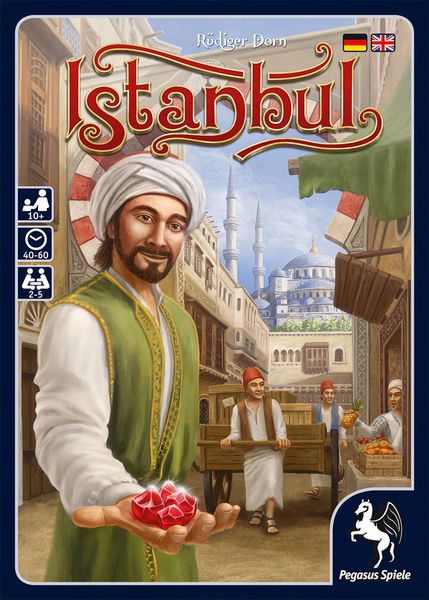Istanbul is a popular board game designed by Rüdiger Dorn and published by Pegasus Spiele in in 2014. It has won several awards, including the Kennerspiel des Jahres award in 2014.
Game Components of Istanbul
Main Board: Created by laying out 20 cards in a 4 by 4 grid, each card representing an action space.Merchant and Assistants: Each player has a merchant and four assistants, which are moved and used to perform tasks.Wheelbarrow: Increases in size as the game progresses, allowing players to carry more goods.Goods and Resources: Various types of goods and resources that players collect and use to acquire rubies.Rubies: The ultimate goal, with players aiming to collect five rubies to win the game.Coins: The currency used for various transactions and actions.Bonus Cards: Provide one-time advantages or flexibility in strategy.Dice: Used in specific locations like the tea house and black market for push-your-luck mechanics.
How To Setup Istanbul
To set up Istanbul, players start by placing the main board, which is a 4 by 4 grid of action cards. Each player selects a merchant and places it on the fountain, along with their four assistants. Players receive a starting amount of coins and a bonus card based on their turn order. The game is ready to begin once all players have their initial setup complete.
Gameplay Mechanics and Game Objective
Movement and Action: Players move their merchant and assistants around the bazaar, performing tasks such as collecting goods, selling goods, upgrading their wheelbarrow, and acquiring rubies.Assistant Management: Careful planning is required to allocate assistants to different tasks and retrieve them when finished.Resource Management: Players must manage goods, coins, and other resources efficiently to achieve their goals.Market and Trade: The value of goods and services changes dynamically as players take actions, affecting the exchange rates and availability of resources.Encounters and Interactions: Players may encounter other players at action spaces, requiring them to pay a fee to access the services.Objective: The goal is to be the first player to collect five rubies through strategic movement, resource management, and efficient use of assistants.
Player Experience
Playing Istanbul is a dynamic and strategic experience, requiring players to optimize their moves and resource usage. The game feels energetic, with a ticking clock set by the financial machinations of opponents. Each turn involves making meaningful decisions, and the game often ends in a close race, revealing the winner only in the final round.
Pros
Strategic Depth: Offers a blend of optimization and unpredictability, keeping players engaged.Elegant Design: The game’s mechanics and components work together seamlessly, providing a satisfying experience.Replay Value: Despite some structural issues, the game remains highly replayable due to its dynamic nature.Family-Friendly: Suitable for families and new players, yet challenging enough for experienced gamers.
Cons
Complexity: While not overly complex, the game requires careful planning and management, which can be overwhelming for new players.Luck Elements: Certain actions, like those at the tea house and black market, introduce luck elements that can significantly affect the game.Replay Value Issues: Some players may find the game’s structural issues eroding its replay value over time.
Personal Thoughts on Istanbul
Istanbul is a game that appeals to a wide range of players, from casual gamers to experienced strategists. It is ideal for those who enjoy economic optimization, resource management, and strategic planning. The game’s unique blend of predictability and unpredictability makes it a great addition to any board game collection. However, it may not be the best fit for players who prefer games with minimal luck elements or those seeking very simple, introductory games.
We are supported by our audience. When you purchase through links on our site, we may earn an affiliate commission, at no extra cost for you. Learn more.

